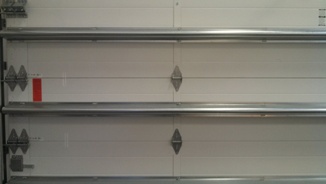Your garage door may be a very weak link during
a hurricane if you live in an Atlantic Ocean or
Gulf of Mexico coastal area as you can see from
the explanation below. Therefore your new garage door may be required by local or state building
codes to meet a certain certified windload rating & may also be required to meet a missile impact test.
Many coastal regions along the southeastern Atlantic coastline and the Gulf of Mexico coastline are following the state of Florida's lead and are requiring that homes, buildings, windows, roofs, and garage doors withstand a certain amount of wind pressure. Although the windload is rated in P.S.F. (pounds per square foot) they generally range from 110 mph to 200 mph wind speed depending on how the wind speed is defined. The windload pressure may be dictated by a state, regional, or local building code but your insurance may also require the door to meet a missile impact test even in some areas that it's not required by the building code. Therefore if you live in a hurricane region, consult with your local IDA garage door dealer for a free in home estimate to determine if a wind rated or hurricane garage door is required in your area by your local or state building codes

In some areas you may be eligible for a discount on
your home owners insurance if you replace your door
with a windloaded garagedoor but your insurance
carrier may have requirements above the building code
in order for you to be eligible for the full discount.
In the past many insurance carriers in Florida required the garage door to meet the stricter Miami-Dade County windload certification in some areas outside of Miami-Dade and Broward counties to get the discount. Although over the last few years most will now accept the doors that meet the building code wind code as long as they will also meet the missile impact test.
However just because your new garage door or prospective one will meet the local windload rating that is required for your area it does not automatically mean that the door meets the missile impact test certification that your carrier may require. Therefore check with your insurance agent to determine the insurance company's discount requirements if you wish to take advantage of this program. In some cases the amount of the discount may exceed the cost of the door to where the new door pays for itself over and over in future savings. Also on some of the more upscale homes some homeowners have reported that their insurance company will cancel the insurance policy completely if the whole house including the garage door isn't upgraded to meet their requirements.
Just because someone advertises a product to protect
your garage door against hurricane winds, it does not
mean that the product will actually work as advertised.
If you are considering to have a product installed on your garage door to brace it for hurricane force winds ask the seller for test data, engineering reports, and/or certification numbers before you purchase the product. Many after market products that are advertised have never been tested or certified to prove that they will actually work during a major thunderstorm let alone a hurricane. Hurricane winds generate positive (inward) and negative (outward) pressures so not only does the door need to be braced to keep it from blowing into the garage but it also needs to be designed so that the door does not get forced out of the garage. Therefore, backing your car(s) up against the door from inside has very little value and may only result in your car(s) being damaged along with the door. Ask your local garage door dealer for a free estimate for a garage door that already meets or exceeds your local windload requirements so you can help protect your home from wind damage and feel safer should you decide to ”ride out” a storm.
Hurricane Andrew proved
|
|
Hurricane Andrew
|
After Hurricane Andrew crossed southeastern Florida in August of 1992, many studies have concluded that the overhead sectional garage door was one of the homes and other buildings weakest points. It was determined that the loss of the garage door contributed significantly to the severe damage and catastrophic loss of many buildings by allowing enough air pressure inside to the structure to literally lift the roof up and off of the walls. Therefore many of today's new building codes and insurance requirements are still based on what was learned from the devastation of this memorable storm. So in order to increase your protection from these powerful storms contact your local garage door dealer today for a manufactured wind loaded door before there is a threat of a storm coming your way. By the time the storm has already begun to form it may be too late to get the new door installed before the storm comes ashore.
Hurricane Charlie proved that the windload ratings for garage doors that were put into effect after Hurricane Andrew were effective
|
|
Hurricane Charlie
|
After Hurricane Charlie struck SW Florida on Aug 13th 2004 we seen first hand where there were literally thousands of non-rated garage doors blown out of the opening but the 130 mph rated doors (doors are designed for a certain wind speed pressure but tested at 1.5 times that pressure, so a 130 mph 30 psf door is tested at 45 psf) not only stayed in the opening but continued to function afterwards. Granted some doors were damaged (dented) from flying debris but the opening and thus the structure remained protected. There were a number of cases where one of the doors that had been replaced with a rated door before the storm survived the storm without a scratch but the non-rated door(s) beside it that hadn't been replaced left the building completely (some were blown into the mangroves and never found). Ask your local garage door dealer today for a free estimate for a garage door that already meets or exceeds your local windload requirements before the next storm heads your way.
Since Hurricane Charlie and a few others the Florida Building Code was updated in the 2010 code to where they use a different wind speed measurement for what buildings need to meet. So the old 110 to 150 mph rated doors are now rated for a higher wind speed using the new measurement, However the design of the doors has little to no difference than before to where a door that was rated for approx 130 mph under the old code before is now rated for approx 170 mph using the same design and the highest rating goes up to 200 mph under the new code. Thus even though your door was installed under the old code there's a good chance that it still meets the new code without doing anything. If you or your insurance agent is sure if it complies contact your local IDA garage door dealer to see if they will inspect it for you and can give you the documentation if it does meet the insurance agents requirements.
If you are a IDA Garage Door Dealer (Members Only) & don’t see your company on our IDA dealer page for your state(s) please contact us and we will make sure to add you during an update.
© 2002-2020 Greg Smith | All Rights Reserved
Site Owned & Maintained By:
Greg Smith
Ft Myers, FL

Garage Doors & Garage Door Openers,
The Best Dealers To Your Door!
We take great pride in this web site. If you should find anything that is not working properly, please contact us with a note of what was not working, along with the type of browser you are using, the version of the browser, and your connection speed. We hope you find our site a worthwhile experience!



